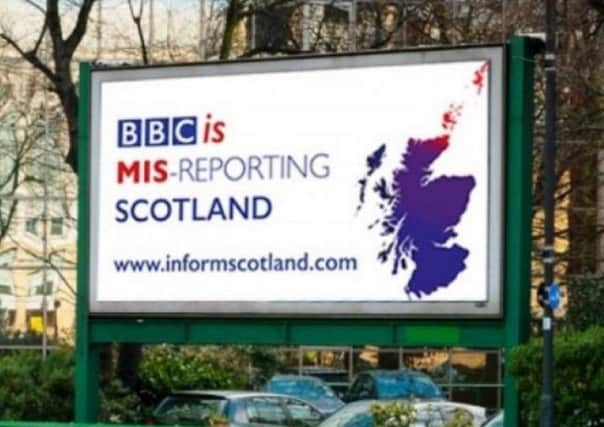Dani Garavelli: Bias billboard sends message to No waverers


It will come as no surprise that this angry man was not the catalyst of my conversion. Rather, he put me on the defensive. How dare he suggest No voters were motivated by anything other than the best interests of the country? It is also the case that his negativity was what I took home from an otherwise enjoyable evening.
Other aspects of the Yes campaign I found off-putting were its maleness (until Women for Independence changed the landscape) and the tendency of a vocal minority towards conspiracy theories: the demonstrations outside Pacific Quay, the references to MI5, and the post-election cries of “fix”. Even when I had decided to vote Yes, an abusive tweet or an unreasonable accusation of MSM bias would cause a spasm of doubt. Would independence really provide the kind of Scotland I hoped for?
Advertisement
Hide AdAdvertisement
Hide AdSince then, we have seen zoomers adopt similar tactics in the EU Referendum and the US election campaigns: the Brexit supporters who dismissed academic experts as members of a metropolitan elite and urged their fellow voters to #Useapen in case of vote-rigging; and the frothing Trump campaigners who chanted “build a wall”. They should have acted as a mirror to the Yes movement, allowing campaigners to see how such behaviour looks to others, and encouraging them to reflect on how the wilder elements could be reined in next time round.
Now – in the wake of the Leave vote – indyref2 is, if not a given, then at least a distinct possibility. Admittedly, some of the anger expressed by Europhile No voters in the immediate aftermath of the result has dissipated during the phoney Brexit war. Even so, the lingering discontent about the prospect of being pulled out of the EU against their will, and uncertainty over the future, means now is the time to be winning over waverers with credible arguments.
Instead – just a week after Nicola Sturgeon launched the consultation on a draft referendum bill – we are back in the land of paranoia and pile-ons. First, a group called Inform Scotland raised thousands of pounds to erect giant billboards accusing the BBC of bias. Bear in mind, this money could have been ploughed in to something positive; something that might have engaged No voters whose sense of Britishness has foundered. But no, those who donated cash would prefer to see it spent on a testament to their own martyr complex; signs that might as well say: “Roll up, roll up, get your grievance politics here.”
Then, when writer and campaigner Kirsty Strickland suggested the billboard might be self-defeating, she found herself “Wingsed” – that is subjected to an attack by the pro-independence blogger Stuart Campbell.
Campbell tracked down an old LinkedIn account in which Strickland refers to a stint she did as a community reporter for the BBC in 2012 (she hadn’t included an end date). The implication was this undermined her neutrality. As it turned out, Strickland did a few weeks’ work experience there, and has since written several damning pieces about specific aspects of its coverage. But this didn’t stop others RT-ing Wings’ screenshot; and when other people stepped in to support her, Wings and some of his followers had a go at them too.
All of this is counterproductive. The BBC may be flawed, but an over-simplification of the problem involved militates against constructive debate. The Inform Scotland website berates the corporation for not blindly accepting Scotland’s education system, its police service and its health service (cough, cough) as the “best in the UK”. Faced with a choice between Inform Scotland’s version of the world and the BBC’s, I know which one No voters are going to trust.
The thing is most people accept there are failings in the way the BBC covers stories north of the border; we should be discussing issues such as ineffective leadership, an obsession with a spurious notion of balance and London’s inability to adapt to constitutional change. But these billboards with their black and white view of the world communicate nothing but their instigators’ monomania.
The Yes movement believes the answer lies in fostering an alternative media and much that is beneficial has come out of that impulse. CommonSpace (where Strickland’s column appeared) produces thought-provoking pieces, but it will never be the first port of call for No voters. Similarly, No voters do not head out to buy a copy of the National of a morning. Indy supporters need to accept, if they are to reach the voters they need to reach, as opposed to just shouting into a vacuum, they must engage with the BBC.
Advertisement
Hide AdAdvertisement
Hide AdWhen it comes to the silencing of dissenting voices, the Yes movement is handing unionists an open goal. It allows them to RT hostile tweets with the hashtag #joyouscivic, to portray Yes as unable to cope with a plurality of opinions and to suggest the zoomer fringe is representative of the whole.
Those who want to erect billboards have every right to do so; trying to shut down their views is no better than trying to shut down Strickland’s. But indyref 2 may be around the corner. The question Yes campaigners face is do you want to sit around grinding axes or do you want to win? If the independence movement is to persuade soft No voters to cross the river, it needs to still the waters and radiate a positivity that makes the journey seem worthwhile.